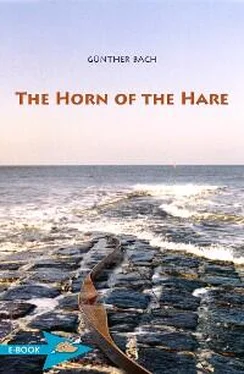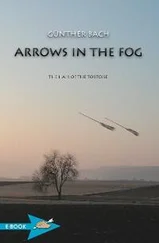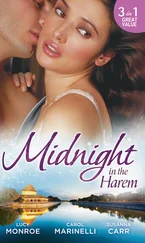I looked at my watch; it showed a few minutes before four, and I hesitated as to what to do next. Behind the curtain of the built-in shelves, I found a quilt, two wool blankets and the blue velvet cushion. The collapsed folding bed on which I had slept for two summers was leaning in the niche behind the square chimney which ran up through the roof in the middle of the room. At that moment, I came to a decision. It was five after four when I turned off the heater, pulled the plug out of the outlet and went downstairs to the workshop. I opened the door to the living room and edged up to the panes of the large terrace windows to take a careful look outside.
The caution was unnecessary. I had to look twice to understand. He had removed the stone flags right in front of the window and planted mallows along the entire width of the windows. They had grown into thick bushes higher than a man’s head, and now a tangle of bare stems blocked any view through the window.
As so often in previous years, I opened the left window and stepped over the low sill between the dripping mallow bushes. There was no one in sight. I stuck a strip of cardboard between the jamb and the window frame and pulled the window closed behind me as tight as it would go. The wind was from the north-west, but even when a gust pushed against the window, you could hardly see that it wasn’t latched. I could only hope that it would hold, I didn’t have the time to do anything more.
I stepped onto the terrace and crossed the flagstones to the path. At the last minute I remembered my coat. I went back across the yard where black puddles had now formed, opened the door to the shed, and took my coat from the nail. I snapped the lock shut and put the key back in its place above the rafter. I put on my coat at the same time, and the wind flattened it against my legs.
It had grown darker. From the west, heavy rain clouds were pushing over the woods, and I ran down the path to the village. At the inn, I paid my bill, got my suitcase, and then went down to the harbor.
Two people whom I didn’t know sat in the ship’s passenger cabin. The harbormaster showed up to cast off the mooring lines, and I shouted a few words about the weather to him. He growled something incomprehensible and went back to his office as the ship pulled out and took up its course after making a wide turn. I paid and put my ticket in the pocket of my coat. I left the ship when it docked at the next village on the island after a half-hour voyage. It was now quite dark.
A horse with its head hanging down stood in front of a wagon filled with empty fish crates next to the store. In the store I bought a loaf of bread, two packages of sliced cheese, and a hard sausage off the shelves. I found a tin of sweetened condensed milk and, just in case, added a package of tea.
I paid at the only open cashier next to the exit, and put everything into my large traveling bag. Then I crossed the street and went past the old mill toward the beach.
The wind drove the rain in my face in sharp bursts as I walked back on the wet hard sand. I followed the curved shoreline until the wooded cliffs rose before me as shadows, while on my left the white foam rushed over the granite blocks of the sea wall.
I continued on to the narrow stairs which led to the top of the sea cliff. The rainwater ran down to the beach in deeply eroded channels next to the half cross ties which made up the steps. The path through the woods, which I only knew from the summer as a green tunnel through thickly growing underbrush, now appeared strange and long to me.
Then once again, I saw the silhouette of the house on the hill. I wanted a cigarette, but I went on across the basin, and then along the path up behind the house. I had had enough of rain, cold, and wind.
I pushed through the mallow bushes to the window, and with some trouble pushed the window inward, slung the traveling bag inside, and then stepped inside behind it. I closed the window, pulled off my shoes and went through the workshop up to the room under the eaves. It was still a little warm. I turned the heater on again and hung the heavy baize curtain in front of the window. Then I screwed in the light bulb in the wall lamp and turned on the light. Although I had slept until noon, I felt tired and worn out.
A puddle had formed under the wet traveling bag, but the bread was on top and had only gotten a little damp. I pulled off my jeans, which were stiff with the wet and sprinkled with sand up to the knees. I dried my hair with a hand towel, pulled on a turtleneck sweater, and put on a second pair of wool socks. Then I took the small packet of tea and went downstairs to the kitchen.
The stairs were slippery. I tried to imagine what would happen if I fell and was injured, but as I thought of it I was already in the kitchen.
The venetian blinds on the window stuck as always. I pulled them down and tied the string around the nail in the window sill. I laid the flashlight on the kitchen table. Its beam made a semi-circular spot on the opposite wall. In the narrow cupboard next to the door I found the tall aluminum pot with the immersion heater and next to it the large yellow cup with a teaspoon in it.
Everything in the cupboard was clean and tidy, only the cup was a little dusty. I held the pot under the water pipe and turned on the faucet, which had dried tightly shut. The pipe knocked noisily and for a while nothing happened. Then rusty water sprayed out of the faucet in small spurts. I put the pot to one side. Gradually the noise in the pipe died down; the water flowed smoothly, even if only in a thin stream, and slowly cleared. I rinsed the pot out, then the cup, and filled the pot half-full. Then I took the brown teapot out of the cupboard.
The sugar in the paper bag had formed a lump as hard as stone. I put it back and plugged in the immersion heater. When the water began to simmer, I rinsed the teapot out with hot water and then waited until the water boiled.
Then I measured out the tea, two tea spoons from the green package. I placed the pot with the immersion heater in the empty sink to let it cool. The potato basket under the kitchen table was empty. I put the full teapot and the cup in it, took a cutting board from the kitchen table and put it in the basket as well, and then took the flashlight and went back up the stairs to the room under the eaves.
While the tea steeped in the pot, I unfolded the bed and pushed it into the niche under the wall lamp. Then I got the blankets and placed them on the narrow bed. With my pocketknife I poked two holes in the top of the can of milk, and put it, the teapot, and the cup on top of the stool. I poured the reddish, amber-colored tea into the cup and then poured the condensed milk in over the teaspoon, which I held above the cup. It ran out of the can in a thin thread which gradually filled the spoon. Then I stirred it in and the color of the tea blended into the milky cloud. I held the cup in both hands while sitting on the bed. The tea was hot and sweet, but it had almost lost its tea taste.
My watch showed seven. I had an entire night and day before me. But the workshop and the terrace room had no curtains – if I wanted to search for something there I had to wait for daylight. So, for this evening, there was only the room under the eaves left. I sipped the tea and looked around the room.
It covered almost the entire floorplan of the house. The longer walls sloped, interrupted on one side by the curve of the dormer with its small window. Shelves had been built in on both sides with sand-colored curtains drawn in front of them. The wall at my back separated the stair to the workshop from the room.
The gable end window under the overhang gave sufficient light to the staircase landing all day long , and from there a trap door led to the attic under the roof peak.
Читать дальше












